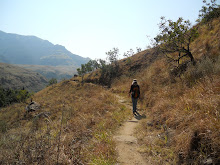One form of memory presents the past as photography - images of arrested experience. It shows how something or someone looks in the duration of its passage from is to was; it elicits its potential to be (again). And our eye sees this in the precision, or the haze, of a moment.
But what about tradition? Tradition isn't photographically preserved in our mind's eye. It seems more ingrained in our bodies. Yet it can be lost. From one generation to the next, it can fade like a lullaby for years sung soft and certain, then hummed, finally succumbing to silence. How do we save it? While some gestures remain, the words gradually slip away. The underlying reasons have long been unspoken. The intention endures, but reality intrudes because the circumstances have changed - borders crossed and re-crossed, countries departed from and returned to, reinhabited but not as home. Pains have been taken to establish a new life, in a new place. That doesn't mean that everything should be new. To some people, roots are valuable, even essential. Roots can tunnel across the earth from north to south, so strong that should they burrow downwards they would eventually meet at the core. Belief rises from depth as deep as this.
What happens, then, when the believers are gone? Perhaps the idea of the tradition remains, diluted, discernible. Like a break in a bone, a hairline gap that is evident even when the bone has healed. It endures in being passed on in those very sounds that fade and cease. They descend through the stages of articulation, through the layers of our apprehension, to the place where they become a type of memory like but not the same as the halted image: a progressive memory. In this place, we hear the believers' voices when they have stopped speaking. Along the way the words have travelled from is to was; now, in the country no longer new, we appreciate them and thus fulfil their potential to be (again).
Tradition progresses in us as fibres of the roots that stretch from there (the origin) to here (the continuation), and we extend roots of our own. Our words may not sound quite the same as the old ones, they may not be what they were, but they convey the belief that we have inherited and made our own.


hi danye! so nice to find your blog here. hope you had a wonderful new years as well.
ReplyDelete